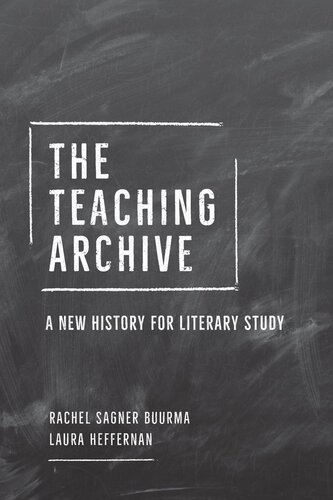

Most ebook files are in PDF format, so you can easily read them using various software such as Foxit Reader or directly on the Google Chrome browser.
Some ebook files are released by publishers in other formats such as .awz, .mobi, .epub, .fb2, etc. You may need to install specific software to read these formats on mobile/PC, such as Calibre.
Please read the tutorial at this link: https://ebookbell.com/faq
We offer FREE conversion to the popular formats you request; however, this may take some time. Therefore, right after payment, please email us, and we will try to provide the service as quickly as possible.
For some exceptional file formats or broken links (if any), please refrain from opening any disputes. Instead, email us first, and we will try to assist within a maximum of 6 hours.
EbookBell Team

5.0
48 reviewsThe Teaching Archive shows us a series of major literary thinkers in a place we seldom remember them inhabiting: the classroom. Rachel Sagner Buurma and Laura Heffernan open up “the teaching archive”—the syllabuses, course descriptions, lecture notes, and class assignments—of critics and scholars including T. S. Eliot, Caroline Spurgeon, I. A. Richards, Edith Rickert, J. Saunders Redding, Edmund Wilson, Cleanth Brooks, Josephine Miles, and Simon J. Ortiz. This new history of English rewrites what we know about the discipline by showing how students helped write foundational works of literary criticism and how English classes at community colleges and HBCUs pioneered the reading methods and expanded canons that came only belatedly to the Ivy League. It reminds us that research and teaching, which institutions often imagine as separate, have always been intertwined in practice. In a contemporary moment of humanities defunding, the casualization of teaching, and the privatization of pedagogy, The Teaching Archive offers a more accurate view of the work we have done in the past and must continue to do in the future.